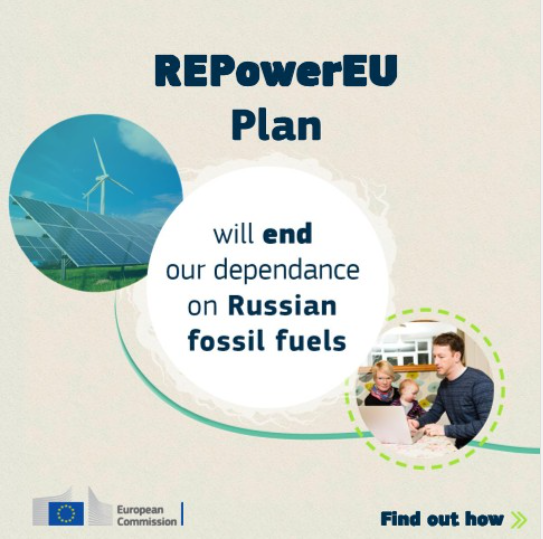The European Commission has presented the REPowerEU Plan, its response to the hardships and global energy market disruption caused by Russia's invasion of Ukraine. There is a double urgency to transform Europe's energy system: ending the EU's dependence on Russian fossil fuels, which are used as an economic and political weapon and cost European taxpayers nearly €100 billion per year, and tackling the climate crisis. By acting as a Union, Europe can phase out its dependency on Russian fossil fuels faster. 85% of Europeans believe that the EU should reduce its dependency on Russian gas and oil as soon as possible to support Ukraine. The measures in the REPowerEU Plan can respond to this ambition, through energy savings, diversification of energy supplies, and accelerated roll-out of renewable energy to replace fossil fuels in homes, industry and power generation.
The green transformation will strengthen economic growth, security, and climate action for Europe and our partners. The Recovery and Resilience Facility (RRF) is at the heart of the REPowerEU Plan, supporting coordinated planning and financing of cross-border and national infrastructure as well as energy projects and reforms. The Commission proposes to make targeted amendments to the RRF Regulation to integrate dedicated REPowerEU chapters in Member States' existing recovery and resilience plans (RRPs), in addition to the large number of relevant reforms and investments which are already in the RRPs. The country-specific recommendations in the 2022 European Semester cycle will feed into this process.
Among the recommendations made my the European Commission are measures are impacting transport and road safety:
- Reduced-speed zones in urban areas
- Reduced speeds on motorways
- Develop car-free zones to facilitate active mobility
- Reduce the price of public transport and rail
- Organizing car free days in cities
- Road charging schemes reducing congestion during peak times and/or incentivizing more sustainable vehicles
- Support bike sharing and other micro-mobility solutions
- Incentivise bike purchases through bike purchase subsidies or tax/VAT reductions
- Incentives/rewards for employees that use public transport or active modes for commuting to work
- Investing in new bike lanes in and around/towards cities
- Promoting/incentivizing last-mile delivery by cargo bike or smaller delivery e-vehicles
- Increasing possibilities to travel on public transport (train, metro) with a bike.
Country
Geographical coverage
Useful links
